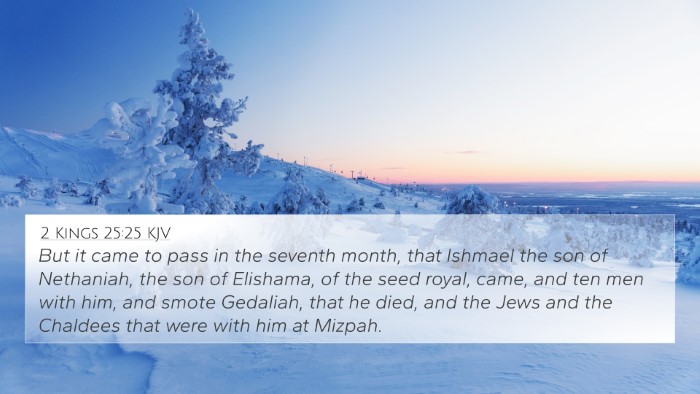Understanding Jeremiah 41:15
Jeremiah 41:15 recounts a historical event involving a fellow named Ishmael,
who committed a grave act against Gedaliah, the appointed governor after
the fall of Jerusalem. This passage highlights themes of betrayal,
political maneuvering, and the turmoil facing the remnant of Judah.
Understanding this verse requires connecting it with other pertinent
scriptures to grasp its wider implications.
Summary of Jeremiah 41:15
In this verse, Ishmael, after assassinating Gedaliah, is described as
attempting to escape, indicating his treachery and the ensuing chaos
that follows Gedaliah's death. This reflects a broader narrative of
despair and instability experienced by the people of Judah in the
aftermath of Babylonian conquest.
Key Themes and Insights
-
Betrayal: Ishmael's actions embody a deep betrayal of trust,
further deepening the suffering of the Jewish people.
-
Political Chaos: Gedaliah was a stabilizing figure,
and his assassination leads to repercussions that threaten the survival
of the remnant in Judah.
-
Despair and Reckoning: The verse foreshadows the
continuing suffering and loss of life in post-exilic Judah.
Cross-References Related to Jeremiah 41:15
- 2 Kings 25:25 - Details the assassination of Gedaliah.
- Jeremiah 40:6-7 - Introduces Gedaliah and his role.
- Jeremiah 41:1-2 - Provides context for Ishmael's actions.
- Isaiah 29:10 - Points to the theme of deception and treachery.
- Jeremiah 38:4 - Discusses the fate of traitors in Jerusalem.
- Matthew 26:25 - Links betrayal in both Testaments with Judas Iscariot.
- Genesis 37:28 - Another betrayal, this time of Joseph by his brothers.
Comparative Analysis with Other Scriptures
Analyzing Jeremiah 41:15 in conjunction with other Bible verses enhances
our understanding of betrayal and its consequences. For example,
Matthew 26:25 echoes the theme of betrayal through Judas Iscariot,
drawing a parallel between the treachery of Ishmael and the New Testament's
reference to betrayal.
Similarly, 2 Kings 25:25 reveals how the aftermath of
leadership instability results in further violence, making it relevant
for understanding the ramifications of Ishmael's actions against
Gedaliah.
Tools for Bible Cross-Referencing
To deepen your study, consider utilizing various tools for Bible
cross-referencing. Resources such as a Bible concordance
can help locate related verses, while a Bible cross-reference guide
assists in identifying connections and themes across both Old and New Testaments.
Conclusion
By exploring Jeremiah 41:15 through the lens of cross-referencing,
one can uncover the rich interconnections between biblical texts.
This verse demonstrates the profound themes of betrayal and its consequences,
encapsulating a critical moment in Jewish history that resonates with
similar New Testament narratives.
Further Study Suggestions
Engaging in a cross-reference Bible study can yield
deeper insights into the narrative methods used by biblical authors.
Consider the ways in which different passages illuminate each other,
thereby enhancing your understanding of scripture as a cohesive whole.










